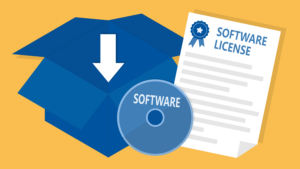The number of software products and their licensing terms (user agreements) is growing rapidly and steadily. In the meantime, users no longer only have to deal with the selection of the appropriate software product. They also have to deal with the appropriate form of license and compliance with the license terms. These usage agreements in particular are becoming increasingly complex. As a result, the field of correct software licensing has become extremely difficult to navigate. So how does software licensing actually work?
What is a Software License?
A license is a legal authorization to do or use something that is illegal without that authorization. Accordingly, a software license grants the licensee the right to use a copy of a software, under a specific user agreement. The user agreement specifies all the conditions for the use or transfer of the software. There are various types of software licenses, including single-user licenses and network licenses.
The idea can be illustrated by the purchase of a train ticket. You want to travel from Aachen to Berlin on 10.03.2023 at 07:30. To do this, you buy a train ticket for this route on exactly this day and at this time. With this ticket you are entitled to start exactly this journey on 10.03.2023. This does not mean that you bought the train, that you are allowed to travel from Aachen to Munich or at any other time.
This is analogous to the purchase of a software license. You want to use a software XYZ for research work. For this reason, you buy a license for this software for two years. The purchase of this software license gives you the right to install and use this software as a copy on a computer according to the usage agreements associated with the license. This does not mean that you have purchased the software, that it may be used for commercial (non-research) purposes, or that it may continue to be installed and used or installed on another computer after the two years have expired.
The Single User License
Single-user licenses can be either computer-bound or user-bound. The computer-bound license (“nodelocked” license) is intended for use on a specific computer. This means that the same number of licenses must be purchased according to the number of computers on which the license is to be installed. In this case, it usually does not matter how many people log on to the computers, because only the devices are counted, not the users. For example, one license may only be installed on one computer, two licenses may then be installed on two computers.
The user-bound license (“Named user” license) is intended for the use of the software by a specific person and can be used on any computer. In this case, the user is licensed and not the computer.
The Network License
The network license, also called “floating” or “concurrent use” license, on the other hand, authorizes the use of the software on any number of computers. The software connects to a license server during use. The license server manages the purchased licenses and releases them for the use of the software. If the purchased number of licenses is in use at the same time, no further licenses are released. Therefore, no more than the purchased number of licenses can be in use at the same time.
Other License Types
Basically, all software is protected by copyright, regardless of the license type in which the software is offered. Even freeware, open source or shareware are subject to license terms. These must be observed, especially if the software is used in a company. In this context, special license conditions may apply. For example, a free right of use (freeware) is usually only granted if the software is not used commercially.
Software Audits
Manufacturers or licensors of software products have the right to check whether the license terms and the conformity of use of their products are being observed. This examination takes place within the framework of a software audit. This audit can be carried out by detecting misuse or by random sampling.
License violations can have severe consequences, and depending on the extent, high additional payments may be due. In this context, the companies reserve the right to claim retroactive maintenance costs for license use in previous years. In addition, penalties can also be claimed. At RWTH Aachen University, responsibility for ensuring adequate licensing is decentralized to the management of the respective university institutions.
Are you as interested in this topic as we are? Then you should keep an eye on our blog. Over the next few weeks, we will share with you how to manage software licenses and explain which tools are used to do so.
Responsible for the content of this article are Claudia Schmidt und Stéphanie Bauens.






Ganz herzlichen Dank für den Post;)
Aras
Hallo Aras,
vielen Dank für deinen positiven Kommentar!
Viele Grüße
das IT Center Blog Team